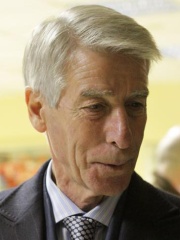
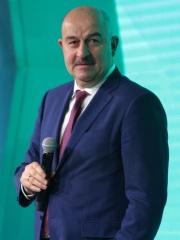
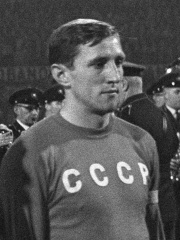
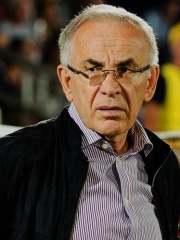
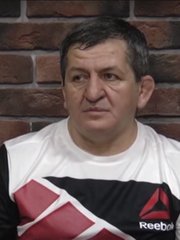
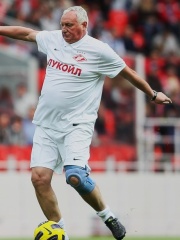
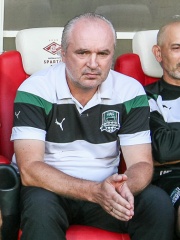
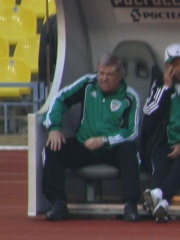
The Most Famous
COACHES from Russia
This page contains a list of the greatest Russian Coaches. The pantheon dataset contains 471 Coaches, 10 of which were born in Russia. This makes Russia the birth place of the 13th most number of Coaches behind Bosnia and Herzegovina, and Croatia.
Top 10
The following people are considered by Pantheon to be the top 10 most legendary Russian Coaches of all time. This list of famous Russian Coaches is sorted by HPI (Historical Popularity Index), a metric that aggregates information on a biography's online popularity. Visit the rankings page to view the entire list of Russian Coaches.

1. Valery Nepomnyashchy (b. 1943)
With an HPI of 59.74, Valery Nepomnyashchy is the most famous Russian Coach. His biography has been translated into 31 different languages on wikipedia.
Valery Kuzmich Nepomnyashchy (Russian: Валерий Кузьмич Непомнящий; born 7 August 1943) is a Russian association football manager and a former player. Most famously he coached the Cameroon national football team when they surprisingly made the quarter-finals in the 1990 FIFA World Cup. From 1992 to 1994 he coached clubs in Turkey. In 1995, he became manager of South Korea's Yukong Elephants (currently Jeju United FC), and in 1996 led them to a victory in League Cup. In 2001, he took over as J. League club Sanfrecce Hiroshima's manager from Eddie Thomson. He has also coached Shanghai Shenhua, (whom he led to a second-place finish for the first time in his career), from 2004 to 2005, and the Uzbekistan national football team in 2006. He worked as a football commentator for a Russian television channel, “NTV-Plus”.

2. Stanislav Cherchesov (b. 1963)
With an HPI of 59.11, Stanislav Cherchesov is the 2nd most famous Russian Coach. His biography has been translated into 44 different languages.
Stanislav Salamovich Cherchesov (Russian: Станислав Саламович Черчесов, pronounced [stənʲɪˈslaf sɐˈlaməvʲɪtɕ tɕɪrˈtɕesəf]; Ossetian: Черчесты Саламы фырт Станислав, romanized: Čerčesty Salamy fyrt Stanislav; born 2 September 1963) is a Russian professional football manager and former goalkeeper. He is the manager of Russian Premier League club Akhmat Grozny. In August 2016, he was appointed as head coach of the Russia national team and led them to the quarter-finals of the 2018 FIFA World Cup. He was dismissed after the team was eliminated in the UEFA Euro 2020 group stage. He took charge of Hungarian side Ferencváros in 2021, winning two consecutive Nemzeti Bajnokság I titles before being sacked in July 2023. From June 2024 to January 2025, he was also the head coach of the Kazakhstan national team.

3. Albert Shesternyov (1941 - 1994)
With an HPI of 58.48, Albert Shesternyov is the 3rd most famous Russian Coach. His biography has been translated into 24 different languages.
Albert Alekseyevich Shesternyov (Russian: Альбе́рт Алексе́евич Шестернёв, IPA: [ɐlʲˈbʲert ɐlʲɪˈksʲeɪvʲɪtɕ ʂɨsʲtʲɪrˈnʲɵf]; 20 June 1941 – 5 November 1994) was a football player for CSKA Moscow and the Soviet Union. He is generally regarded as the best football defender in Soviet football history. Shesternyov was born and died in Moscow. Nicknamed "Ivan the Terrible", he was the captain of the great Soviet team of the 1960s, he earned 90 caps an appearance record only broken subsequently by Oleg Blokhin and Rinat Dasaev in the late 1980s. An international from 1961 to 1971, the CSKA Moscow libero played and represented his country at three FIFA World Cups and two European Championships: 1964 European Nations' Cup and the UEFA Euro 1968. During the latter tournament the Soviet team faced Italy in one of the semi-finals. The game finished in a 0–0 tie, (including extra time), and according to the rules at the time the winner was to be decided by a coin toss. The Soviet side were given the opportunity to call the coin, and as captain Shesternyov called it. He called it incorrectly and they were out of the final. They finished in 4th place, after losing to England in the Third place play-off game. Shesternyov was captain of the Soviet national team for 62 of his 90 caps. He was CSKA Moscow's youngest ever debutant at 17 years old and also the club's youngest ever captain at just 21 years old. He captained the club for nearly 10 years and played his entire career with CSKA Moscow. Shesternyov featured in the European Championships - UEFA Teams of Tournament twice and was the Soviet Footballer of the Year in 1970, he was also voted 3rd in 1966, 1968 & 1969. After leading CSKA to their first national title in 19 years he chose to retire from football on a high at only 30. He was voted, by Ballon d'Or, the 14th, 11th, 10th and then 22nd best footballer in the world in 1968, 1969, 1970 and 1971 respectively. During these years he was regarded as one of the best defenders in the world and if he had chosen to join one of the many European big teams that were chasing him, many said he would have been even more so highly regarded in the footballing world. He was, however, always commended for his one-club career. He was recently voted into the Soviet Union all-time World Cup team by football media website PlanetWorldCup. In 1970, he became the Soviet Footballer of the Year.

4. Gadzhi Gadzhiyev (b. 1945)
With an HPI of 55.37, Gadzhi Gadzhiyev is the 4th most famous Russian Coach. His biography has been translated into 22 different languages.
Gadzhi Muslimovich Gadzhiyev (Russian: Гаджи Муслимович Гаджиев; born 28 October 1945) is a Russian football manager who is the president of FC Dynamo Makhachkala.
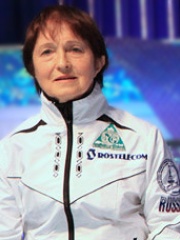
5. Tamara Moskvina (b. 1941)
With an HPI of 54.44, Tamara Moskvina is the 5th most famous Russian Coach. Her biography has been translated into 15 different languages.
Tamara Nikolayevna Moskvina (Russian: , née Bratus, Братусь; born 26 June 1941) is a Soviet and Russian pair skating coach and former competitive skater. Competing in pairs with Alexei Mishin, she became the 1969 World silver medalist and Soviet national champion. As a singles skater, she was a five-time (1962–1966) Soviet national champion. She later became a successful coach, leading at least one pair to an Olympic medal in six consecutive Winter Olympics from 1984 to 2002 and twice coaching the gold and silver medal-winning pairs, in 1992 and 1998. Married to Igor Moskvin, Moskvina is based in Saint Petersburg, Russia.

6. Abdulmanap Nurmagomedov (1962 - 2020)
With an HPI of 53.10, Abdulmanap Nurmagomedov is the 6th most famous Russian Coach. His biography has been translated into 15 different languages.
Abdulmanap Magomedovich Nurmagomedov (Russian: Абдулманап Магомедович Нурмагомедов; 10 December 1962 – 3 July 2020) was a Russian military veteran, former judoka, and combat sports coach. In September 2019, he was named by the Russian Book of Records as the most successful combat sambo coach in the country. He was the head coach of Eagles MMA and had coached two UFC world champions, his son Khabib Nurmagomedov as well as Islam Makhachev.

7. Yuri Gavrilov (b. 1953)
With an HPI of 50.64, Yuri Gavrilov is the 7th most famous Russian Coach. His biography has been translated into 21 different languages.
Yuri Vasilyevich Gavrilov (Russian: Юрий Васильевич Гаврилов; born 3 May 1953 in Setun, Odintsovsky District, Moscow Oblast) is a Russian football manager and a former midfielder who played for Dynamo Moscow and Spartak Moscow. He made 46 appearances for the Soviet Union national football team and scored 10 goals. He also competed for the Soviet Union at the 1980 Summer Olympics and the 1982 FIFA World Cup in Spain. His creative skills are immortalized by Konstantin Beskov's famous phrase "If you don't know what to do with the ball, pass it to Gavrilov". Yuri Gavrilov has his own football school in Moscow called SC Svyatogor.

8. Igor Shalimov (b. 1969)
With an HPI of 50.27, Igor Shalimov is the 8th most famous Russian Coach. His biography has been translated into 22 different languages.
Igor Mihailovich Shalimov (Russian: Игорь Михайлович Шалимов; born 2 February 1969) is a Russian football manager and former player. During his playing career, he played as a midfielder, primarily in the wide position.

9. Anatoly Baidachny (b. 1952)
With an HPI of 49.74, Anatoly Baidachny is the 9th most famous Russian Coach. His biography has been translated into 19 different languages.
Anatoly Nikolayevich Baidachny (Russian: Анатолий Николаевич Байдачный) (born 1 October 1952) is a Russian football manager.
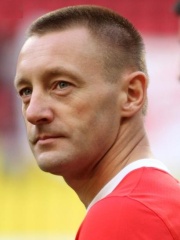
10. Andrey Tikhonov (b. 1970)
With an HPI of 43.00, Andrey Tikhonov is the 10th most famous Russian Coach. His biography has been translated into 19 different languages.
Andrey Valeryevich Tikhonov (Russian: Андрей Валерьевич Тихонов; born 16 October 1970) is a Russian football manager and a former midfielder. Tikhonov is primarily known for having played for Spartak Moscow and the Russia national football team.
People
Pantheon has 10 people classified as Russian coaches born between 1941 and 1970. Of these 10, 8 (80.00%) of them are still alive today. The most famous living Russian coaches include Valery Nepomnyashchy, Stanislav Cherchesov, and Gadzhi Gadzhiyev. The most famous deceased Russian coaches include Albert Shesternyov, and Abdulmanap Nurmagomedov. As of April 2024, 1 new Russian coaches have been added to Pantheon including Abdulmanap Nurmagomedov.
Living Russian Coaches
Go to all RankingsValery Nepomnyashchy
1943 - Present
HPI: 59.74
Stanislav Cherchesov
1963 - Present
HPI: 59.11
Gadzhi Gadzhiyev
1945 - Present
HPI: 55.37
Tamara Moskvina
1941 - Present
HPI: 54.44
Yuri Gavrilov
1953 - Present
HPI: 50.64
Igor Shalimov
1969 - Present
HPI: 50.27
Anatoly Baidachny
1952 - Present
HPI: 49.74
Andrey Tikhonov
1970 - Present
HPI: 43.00

